Analyzing AI's Impact on Future Organizations - WORK 5003, 2018
VerifiedAdded on 2023/06/08
|7
|1278
|126
Essay
AI Summary
This essay discusses the transformative role of artificial intelligence in future organizations, highlighting its potential to automate operations, improve efficiency, and generate innovative ideas. It addresses concerns about job displacement while also noting the potential for new job creation and the importance of human-AI collaboration. The report also touches on AI's ability to manage data, make predictions, and support human resource management, ultimately improving the speed, quality, and cost of services. The document is available on Desklib, where students can find a wealth of study resources and solved assignments.
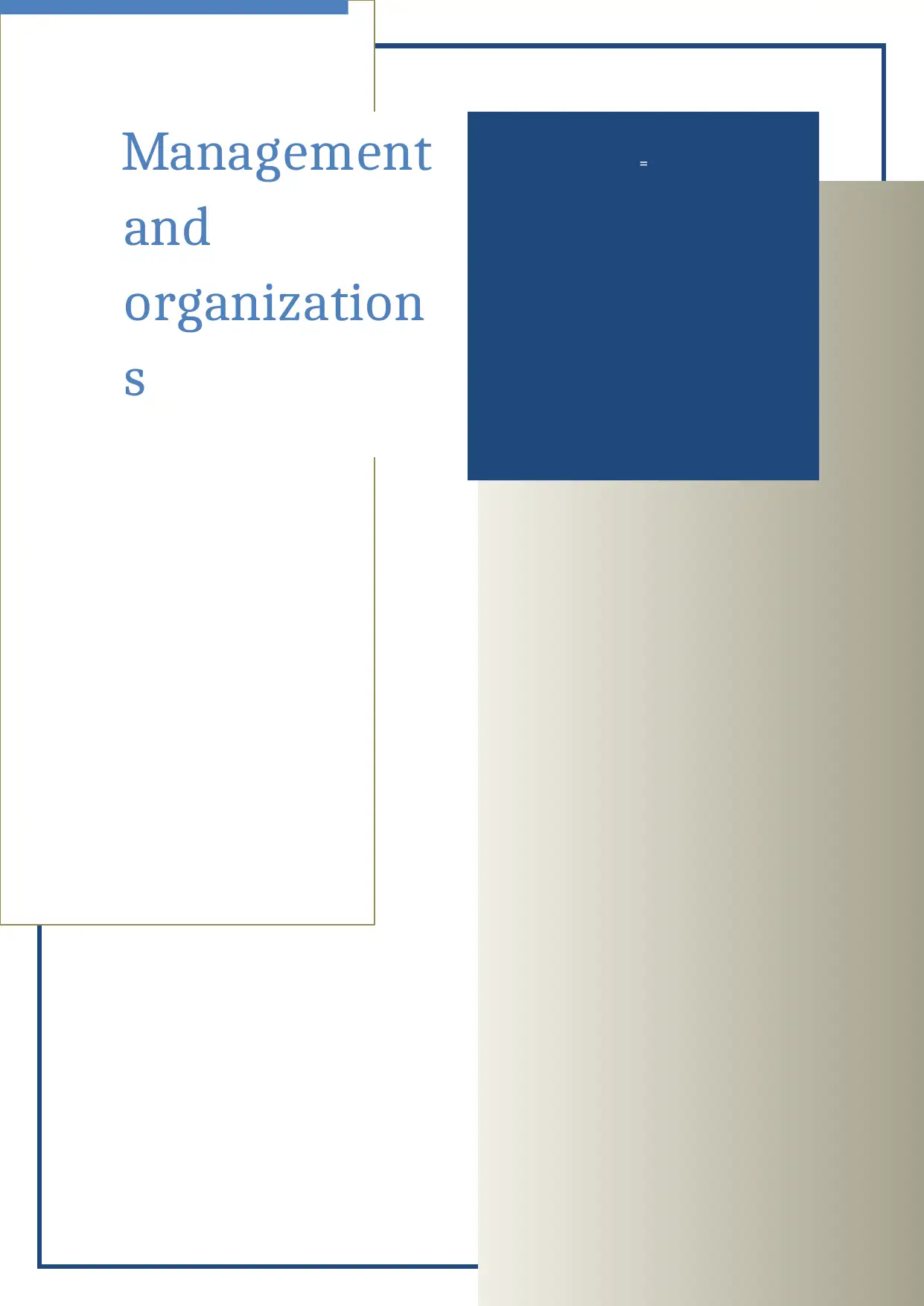
=Management
and
organization
s
and
organization
s
Paraphrase This Document
Need a fresh take? Get an instant paraphrase of this document with our AI Paraphraser
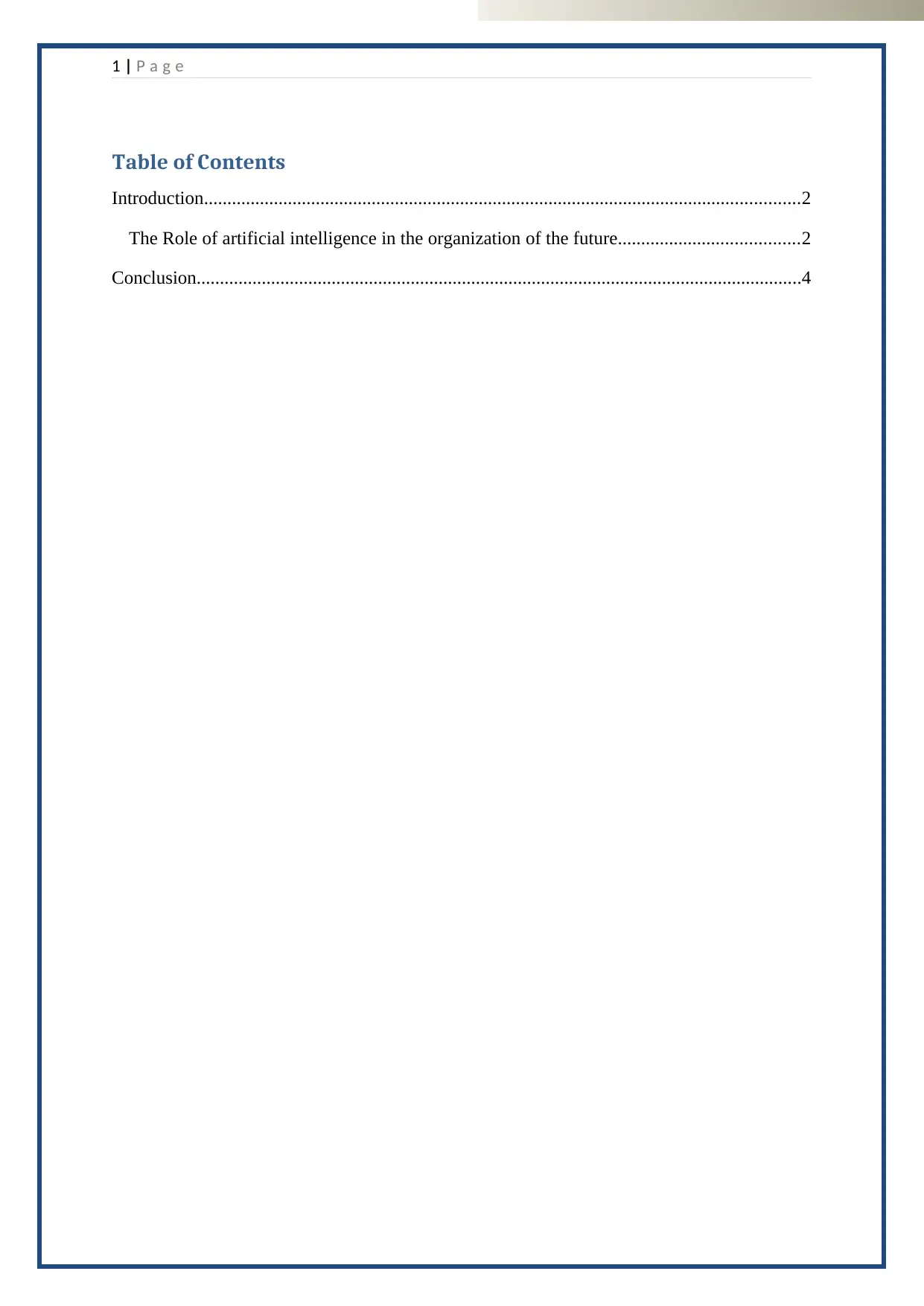
1 | P a g e
Table of Contents
Introduction................................................................................................................................2
The Role of artificial intelligence in the organization of the future.......................................2
Conclusion..................................................................................................................................4
Table of Contents
Introduction................................................................................................................................2
The Role of artificial intelligence in the organization of the future.......................................2
Conclusion..................................................................................................................................4
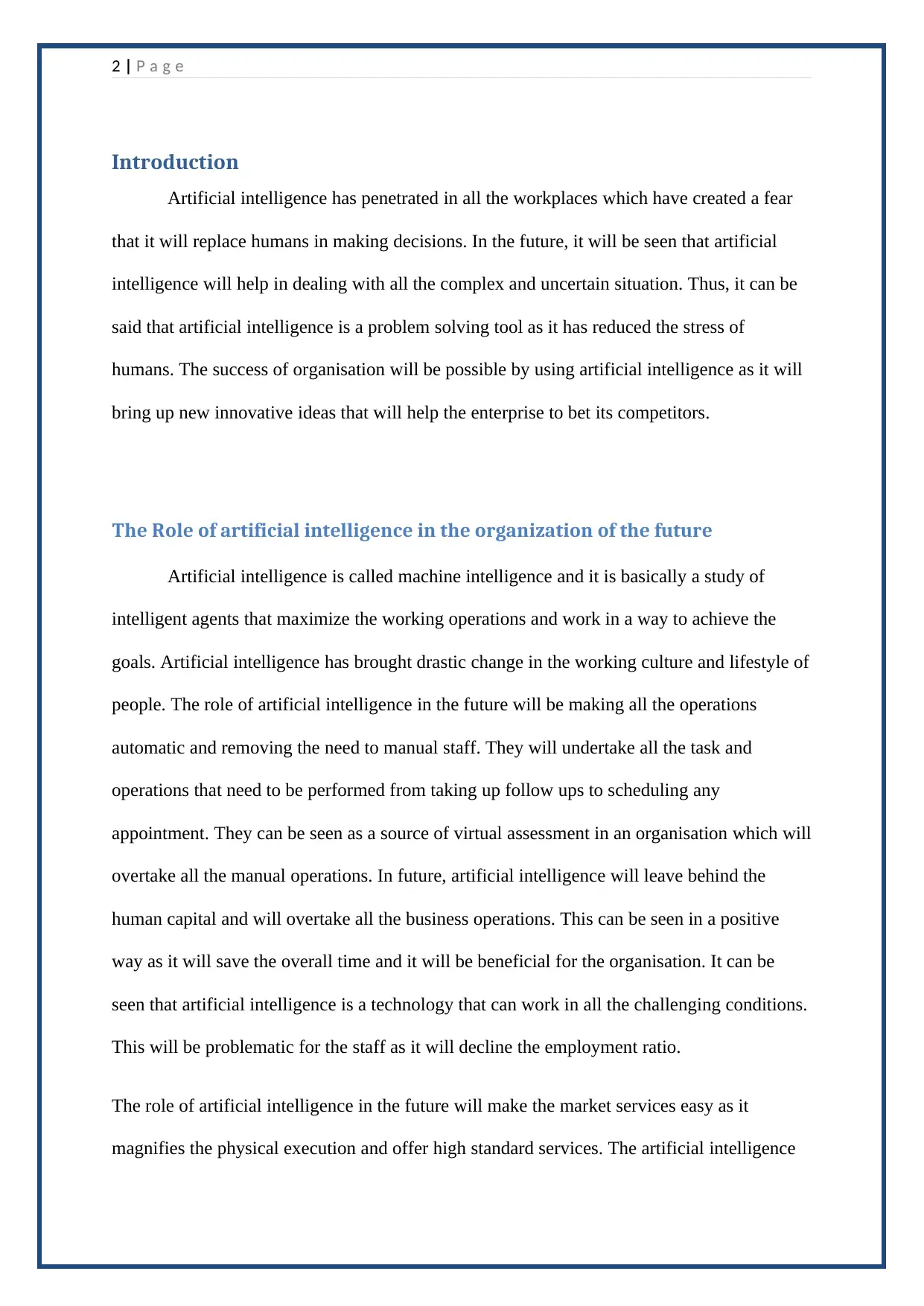
2 | P a g e
Introduction
Artificial intelligence has penetrated in all the workplaces which have created a fear
that it will replace humans in making decisions. In the future, it will be seen that artificial
intelligence will help in dealing with all the complex and uncertain situation. Thus, it can be
said that artificial intelligence is a problem solving tool as it has reduced the stress of
humans. The success of organisation will be possible by using artificial intelligence as it will
bring up new innovative ideas that will help the enterprise to bet its competitors.
The Role of artificial intelligence in the organization of the future
Artificial intelligence is called machine intelligence and it is basically a study of
intelligent agents that maximize the working operations and work in a way to achieve the
goals. Artificial intelligence has brought drastic change in the working culture and lifestyle of
people. The role of artificial intelligence in the future will be making all the operations
automatic and removing the need to manual staff. They will undertake all the task and
operations that need to be performed from taking up follow ups to scheduling any
appointment. They can be seen as a source of virtual assessment in an organisation which will
overtake all the manual operations. In future, artificial intelligence will leave behind the
human capital and will overtake all the business operations. This can be seen in a positive
way as it will save the overall time and it will be beneficial for the organisation. It can be
seen that artificial intelligence is a technology that can work in all the challenging conditions.
This will be problematic for the staff as it will decline the employment ratio.
The role of artificial intelligence in the future will make the market services easy as it
magnifies the physical execution and offer high standard services. The artificial intelligence
Introduction
Artificial intelligence has penetrated in all the workplaces which have created a fear
that it will replace humans in making decisions. In the future, it will be seen that artificial
intelligence will help in dealing with all the complex and uncertain situation. Thus, it can be
said that artificial intelligence is a problem solving tool as it has reduced the stress of
humans. The success of organisation will be possible by using artificial intelligence as it will
bring up new innovative ideas that will help the enterprise to bet its competitors.
The Role of artificial intelligence in the organization of the future
Artificial intelligence is called machine intelligence and it is basically a study of
intelligent agents that maximize the working operations and work in a way to achieve the
goals. Artificial intelligence has brought drastic change in the working culture and lifestyle of
people. The role of artificial intelligence in the future will be making all the operations
automatic and removing the need to manual staff. They will undertake all the task and
operations that need to be performed from taking up follow ups to scheduling any
appointment. They can be seen as a source of virtual assessment in an organisation which will
overtake all the manual operations. In future, artificial intelligence will leave behind the
human capital and will overtake all the business operations. This can be seen in a positive
way as it will save the overall time and it will be beneficial for the organisation. It can be
seen that artificial intelligence is a technology that can work in all the challenging conditions.
This will be problematic for the staff as it will decline the employment ratio.
The role of artificial intelligence in the future will make the market services easy as it
magnifies the physical execution and offer high standard services. The artificial intelligence
⊘ This is a preview!⊘
Do you want full access?
Subscribe today to unlock all pages.

Trusted by 1+ million students worldwide
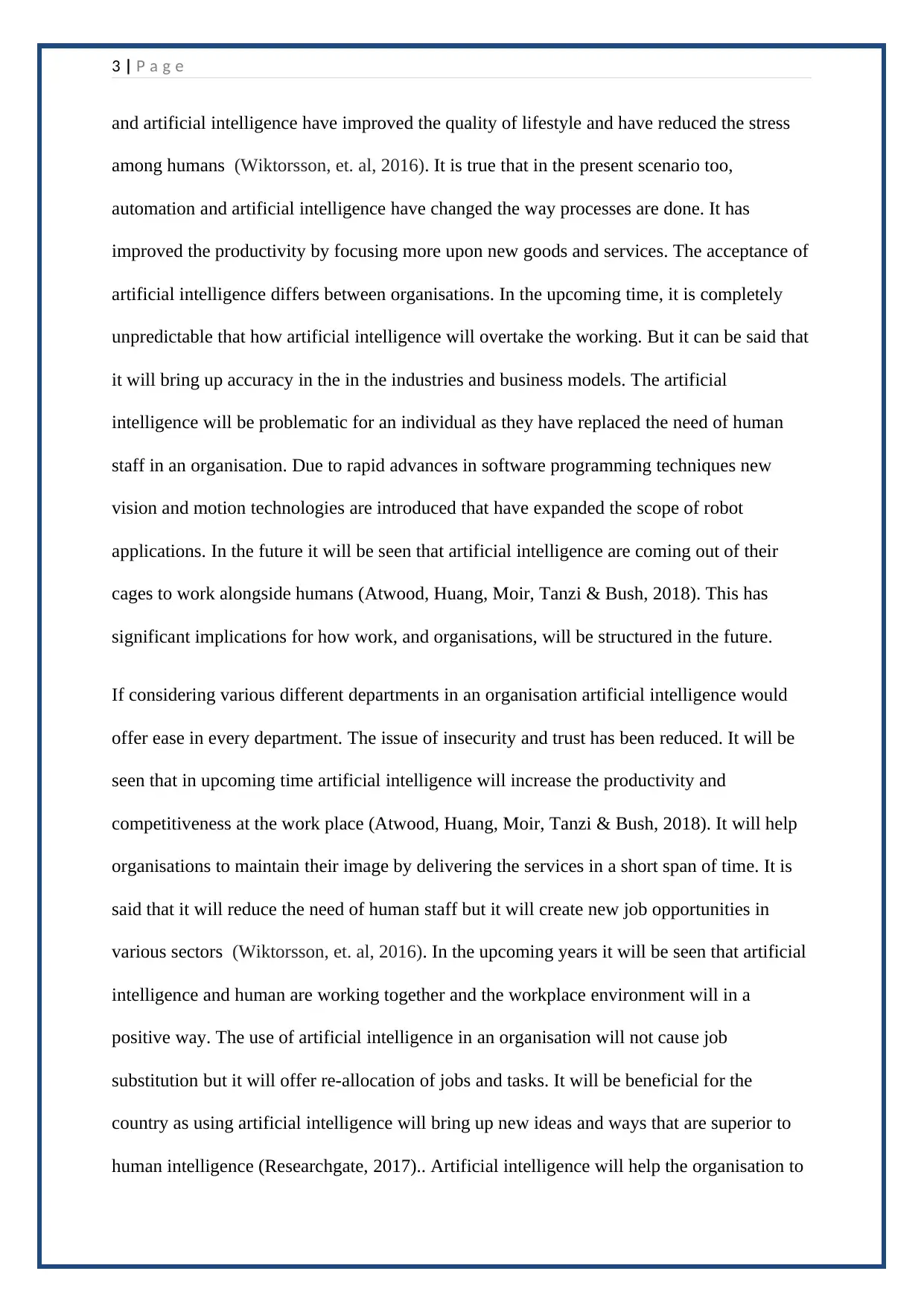
3 | P a g e
and artificial intelligence have improved the quality of lifestyle and have reduced the stress
among humans (Wiktorsson, et. al, 2016). It is true that in the present scenario too,
automation and artificial intelligence have changed the way processes are done. It has
improved the productivity by focusing more upon new goods and services. The acceptance of
artificial intelligence differs between organisations. In the upcoming time, it is completely
unpredictable that how artificial intelligence will overtake the working. But it can be said that
it will bring up accuracy in the in the industries and business models. The artificial
intelligence will be problematic for an individual as they have replaced the need of human
staff in an organisation. Due to rapid advances in software programming techniques new
vision and motion technologies are introduced that have expanded the scope of robot
applications. In the future it will be seen that artificial intelligence are coming out of their
cages to work alongside humans (Atwood, Huang, Moir, Tanzi & Bush, 2018). This has
significant implications for how work, and organisations, will be structured in the future.
If considering various different departments in an organisation artificial intelligence would
offer ease in every department. The issue of insecurity and trust has been reduced. It will be
seen that in upcoming time artificial intelligence will increase the productivity and
competitiveness at the work place (Atwood, Huang, Moir, Tanzi & Bush, 2018). It will help
organisations to maintain their image by delivering the services in a short span of time. It is
said that it will reduce the need of human staff but it will create new job opportunities in
various sectors (Wiktorsson, et. al, 2016). In the upcoming years it will be seen that artificial
intelligence and human are working together and the workplace environment will in a
positive way. The use of artificial intelligence in an organisation will not cause job
substitution but it will offer re-allocation of jobs and tasks. It will be beneficial for the
country as using artificial intelligence will bring up new ideas and ways that are superior to
human intelligence (Researchgate, 2017).. Artificial intelligence will help the organisation to
and artificial intelligence have improved the quality of lifestyle and have reduced the stress
among humans (Wiktorsson, et. al, 2016). It is true that in the present scenario too,
automation and artificial intelligence have changed the way processes are done. It has
improved the productivity by focusing more upon new goods and services. The acceptance of
artificial intelligence differs between organisations. In the upcoming time, it is completely
unpredictable that how artificial intelligence will overtake the working. But it can be said that
it will bring up accuracy in the in the industries and business models. The artificial
intelligence will be problematic for an individual as they have replaced the need of human
staff in an organisation. Due to rapid advances in software programming techniques new
vision and motion technologies are introduced that have expanded the scope of robot
applications. In the future it will be seen that artificial intelligence are coming out of their
cages to work alongside humans (Atwood, Huang, Moir, Tanzi & Bush, 2018). This has
significant implications for how work, and organisations, will be structured in the future.
If considering various different departments in an organisation artificial intelligence would
offer ease in every department. The issue of insecurity and trust has been reduced. It will be
seen that in upcoming time artificial intelligence will increase the productivity and
competitiveness at the work place (Atwood, Huang, Moir, Tanzi & Bush, 2018). It will help
organisations to maintain their image by delivering the services in a short span of time. It is
said that it will reduce the need of human staff but it will create new job opportunities in
various sectors (Wiktorsson, et. al, 2016). In the upcoming years it will be seen that artificial
intelligence and human are working together and the workplace environment will in a
positive way. The use of artificial intelligence in an organisation will not cause job
substitution but it will offer re-allocation of jobs and tasks. It will be beneficial for the
country as using artificial intelligence will bring up new ideas and ways that are superior to
human intelligence (Researchgate, 2017).. Artificial intelligence will help the organisation to
Paraphrase This Document
Need a fresh take? Get an instant paraphrase of this document with our AI Paraphraser
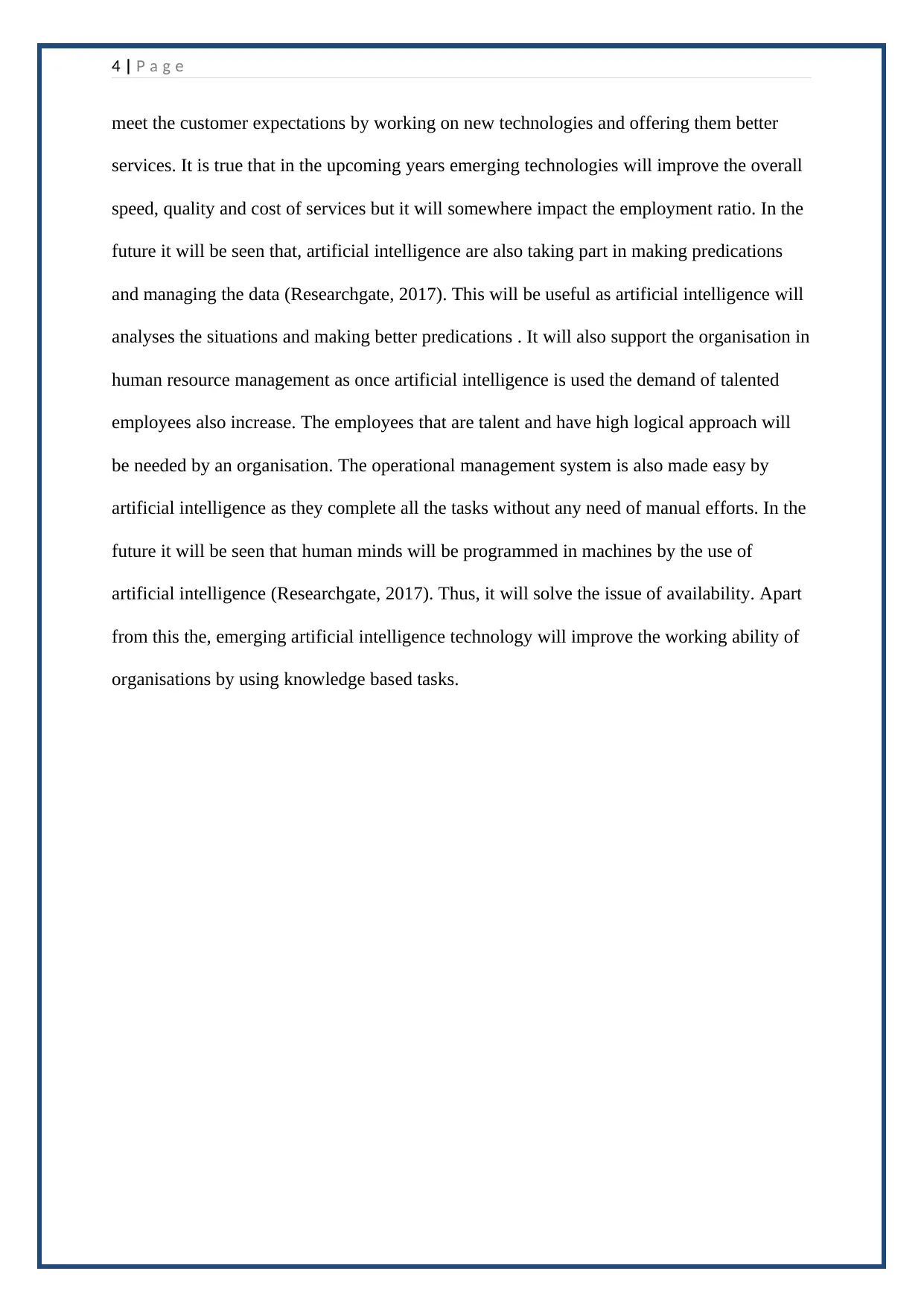
4 | P a g e
meet the customer expectations by working on new technologies and offering them better
services. It is true that in the upcoming years emerging technologies will improve the overall
speed, quality and cost of services but it will somewhere impact the employment ratio. In the
future it will be seen that, artificial intelligence are also taking part in making predications
and managing the data (Researchgate, 2017). This will be useful as artificial intelligence will
analyses the situations and making better predications . It will also support the organisation in
human resource management as once artificial intelligence is used the demand of talented
employees also increase. The employees that are talent and have high logical approach will
be needed by an organisation. The operational management system is also made easy by
artificial intelligence as they complete all the tasks without any need of manual efforts. In the
future it will be seen that human minds will be programmed in machines by the use of
artificial intelligence (Researchgate, 2017). Thus, it will solve the issue of availability. Apart
from this the, emerging artificial intelligence technology will improve the working ability of
organisations by using knowledge based tasks.
meet the customer expectations by working on new technologies and offering them better
services. It is true that in the upcoming years emerging technologies will improve the overall
speed, quality and cost of services but it will somewhere impact the employment ratio. In the
future it will be seen that, artificial intelligence are also taking part in making predications
and managing the data (Researchgate, 2017). This will be useful as artificial intelligence will
analyses the situations and making better predications . It will also support the organisation in
human resource management as once artificial intelligence is used the demand of talented
employees also increase. The employees that are talent and have high logical approach will
be needed by an organisation. The operational management system is also made easy by
artificial intelligence as they complete all the tasks without any need of manual efforts. In the
future it will be seen that human minds will be programmed in machines by the use of
artificial intelligence (Researchgate, 2017). Thus, it will solve the issue of availability. Apart
from this the, emerging artificial intelligence technology will improve the working ability of
organisations by using knowledge based tasks.
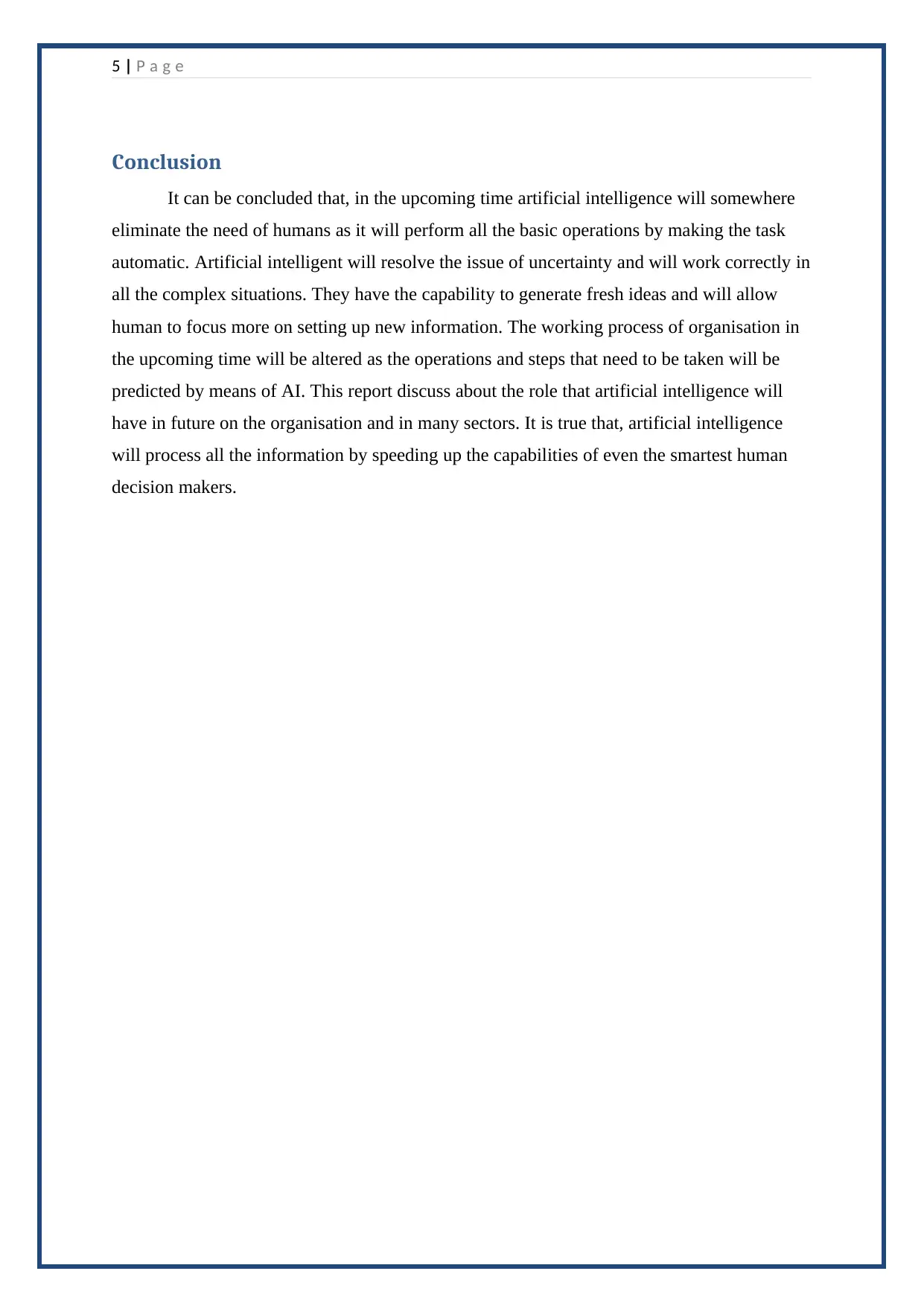
5 | P a g e
Conclusion
It can be concluded that, in the upcoming time artificial intelligence will somewhere
eliminate the need of humans as it will perform all the basic operations by making the task
automatic. Artificial intelligent will resolve the issue of uncertainty and will work correctly in
all the complex situations. They have the capability to generate fresh ideas and will allow
human to focus more on setting up new information. The working process of organisation in
the upcoming time will be altered as the operations and steps that need to be taken will be
predicted by means of AI. This report discuss about the role that artificial intelligence will
have in future on the organisation and in many sectors. It is true that, artificial intelligence
will process all the information by speeding up the capabilities of even the smartest human
decision makers.
Conclusion
It can be concluded that, in the upcoming time artificial intelligence will somewhere
eliminate the need of humans as it will perform all the basic operations by making the task
automatic. Artificial intelligent will resolve the issue of uncertainty and will work correctly in
all the complex situations. They have the capability to generate fresh ideas and will allow
human to focus more on setting up new information. The working process of organisation in
the upcoming time will be altered as the operations and steps that need to be taken will be
predicted by means of AI. This report discuss about the role that artificial intelligence will
have in future on the organisation and in many sectors. It is true that, artificial intelligence
will process all the information by speeding up the capabilities of even the smartest human
decision makers.
⊘ This is a preview!⊘
Do you want full access?
Subscribe today to unlock all pages.

Trusted by 1+ million students worldwide
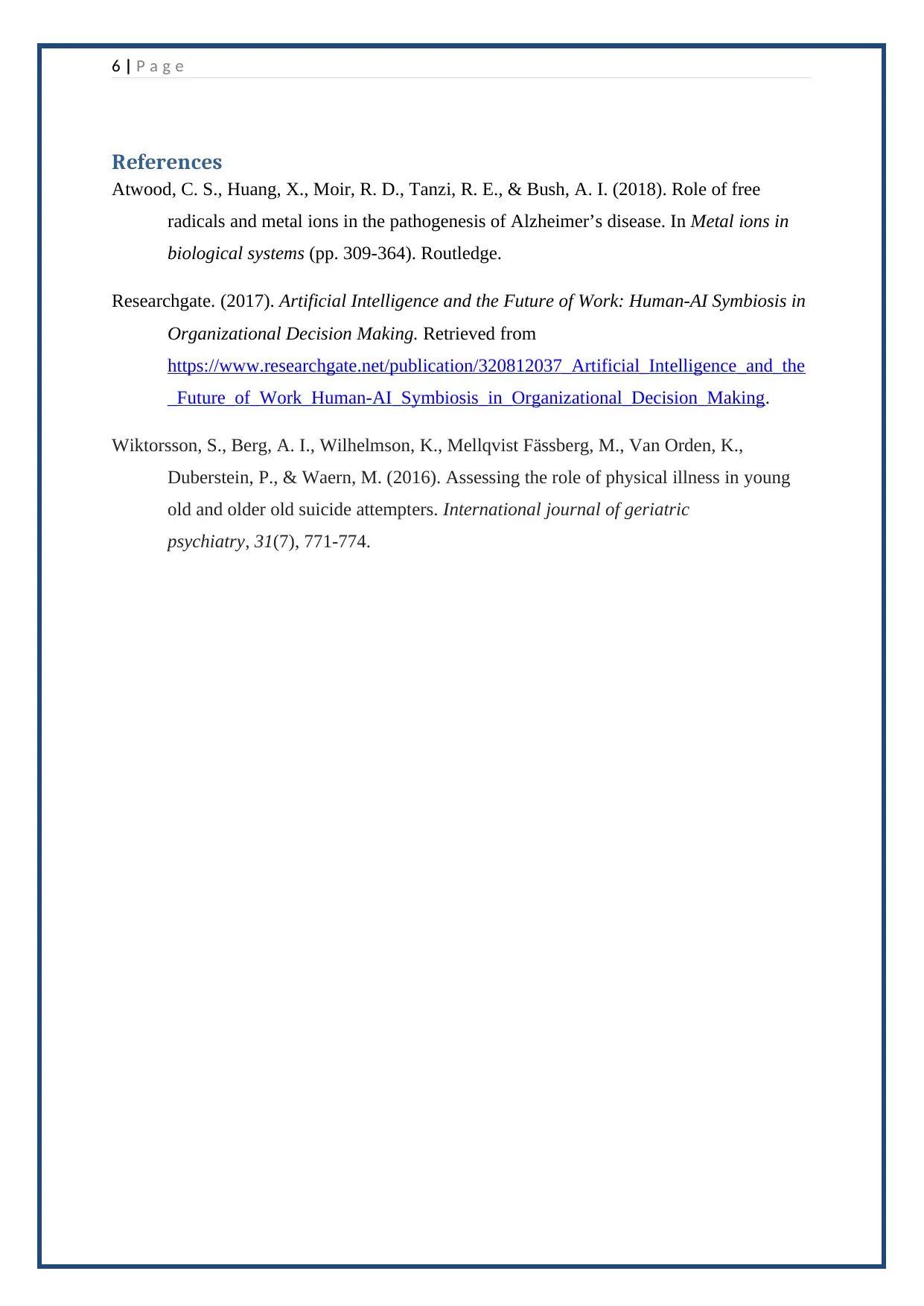
6 | P a g e
References
Atwood, C. S., Huang, X., Moir, R. D., Tanzi, R. E., & Bush, A. I. (2018). Role of free
radicals and metal ions in the pathogenesis of Alzheimer’s disease. In Metal ions in
biological systems (pp. 309-364). Routledge.
Researchgate. (2017). Artificial Intelligence and the Future of Work: Human-AI Symbiosis in
Organizational Decision Making. Retrieved from
https://www.researchgate.net/publication/320812037_Artificial_Intelligence_and_the
_Future_of_Work_Human-AI_Symbiosis_in_Organizational_Decision_Making.
Wiktorsson, S., Berg, A. I., Wilhelmson, K., Mellqvist Fässberg, M., Van Orden, K.,
Duberstein, P., & Waern, M. (2016). Assessing the role of physical illness in young
old and older old suicide attempters. International journal of geriatric
psychiatry, 31(7), 771-774.
References
Atwood, C. S., Huang, X., Moir, R. D., Tanzi, R. E., & Bush, A. I. (2018). Role of free
radicals and metal ions in the pathogenesis of Alzheimer’s disease. In Metal ions in
biological systems (pp. 309-364). Routledge.
Researchgate. (2017). Artificial Intelligence and the Future of Work: Human-AI Symbiosis in
Organizational Decision Making. Retrieved from
https://www.researchgate.net/publication/320812037_Artificial_Intelligence_and_the
_Future_of_Work_Human-AI_Symbiosis_in_Organizational_Decision_Making.
Wiktorsson, S., Berg, A. I., Wilhelmson, K., Mellqvist Fässberg, M., Van Orden, K.,
Duberstein, P., & Waern, M. (2016). Assessing the role of physical illness in young
old and older old suicide attempters. International journal of geriatric
psychiatry, 31(7), 771-774.
1 out of 7
Related Documents
Your All-in-One AI-Powered Toolkit for Academic Success.
+13062052269
info@desklib.com
Available 24*7 on WhatsApp / Email
![[object Object]](/_next/static/media/star-bottom.7253800d.svg)
Unlock your academic potential
Copyright © 2020–2025 A2Z Services. All Rights Reserved. Developed and managed by ZUCOL.





